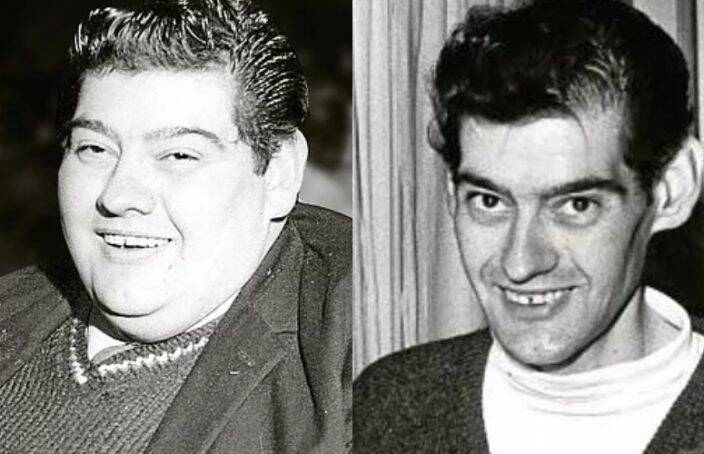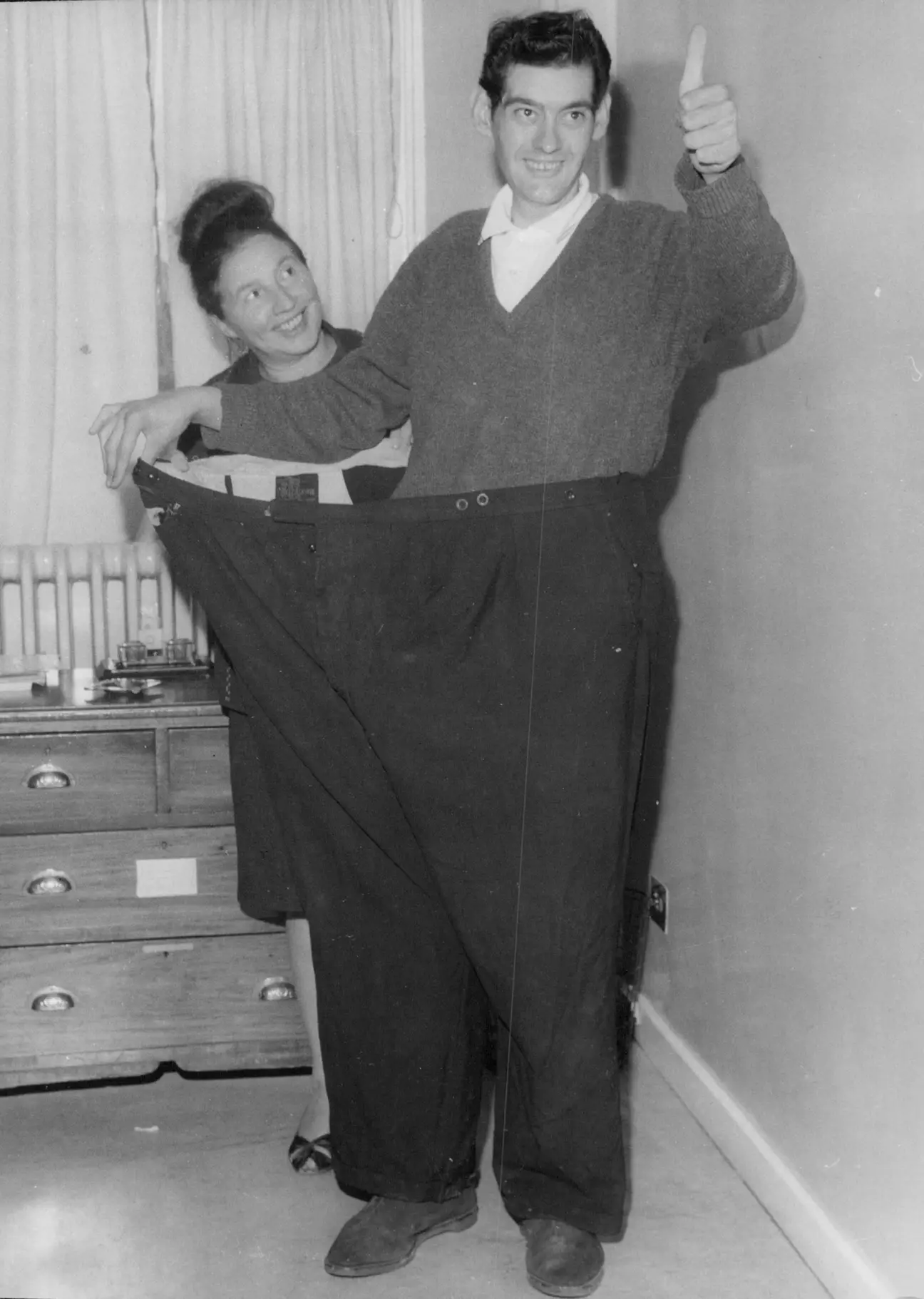Angus Barbieri consumed nothing but vitamins and zero-calorie beverages for over a year while on history’s longest fast — which helped him lose 276 pounds.

Find A GraveAngus Barbieri before and after his fast, in which he lost 276 pounds.
Angus Barbieri was fed up with being overweight. At the age of just 27, he weighed 456 pounds and struggled with food addiction. So in June 1965, he walked into the Royal Infirmary of Dundee and told the doctors he wanted to go on a fast.
Initially, he planned to fast for no more than 40 days, the longest medically recommended fasting duration. But his body adjusted surprisingly well, and he told his doctors he wanted to continue — and ended up going entirely without food for over a year. In the end, he fasted for 382 days and lost 276 pounds.
But how was Angus Barbieri’s record-breaking fast even possible?
The Start Of Angus Barbieri’s Fast
Angus Barbieri was born in Scotland in the late 1930s. Beyond the fact that he worked at his father’s fish-and-chips shop, little is known about his early life.
At 27 years old, Barbieri weighed 456 pounds. He suffered from a crippling food addiction and was tired of being overweight. He decided to take drastic action to reach his goal weight of 180 pounds.
The doctors initially prescribed a short fast, in which Barbieri would not eat any solid food. But after this short period was up, he wanted to keep going. His doctors agreed to allow him to continue the fast under medical supervision.
Barbieri was prescribed multivitamins, including potassium, sodium, and yeast, to compensate for the lack of nutrients. Besides the supplements, Angus Barbieri lived off of low calorie or calorie-free beverages like black coffee, tea, and sparkling water.
He spent most of the fast at home, but made regular visits to the hospital for checkups, sometimes staying overnight so doctors could monitor his progress and check his blood levels. Shockingly, aside from having lower glucose levels, which didn’t appear to have any negative effects, his body was perfectly fine.
Because he wasn’t eating solid foods, he reportedly only needed to go to the bathroom once every 40 to 50 days.
The Effects Of The Fast
In July 1966, after one year and 17 days of going completely without food, Angus Barbieri had reached his goal weight of 180 pounds. He had lost 276 pounds at an average rate of three quarters of a pound per day, or about 22 pounds a month.
Barbieri finally broke his fast with a boiled egg and a slice of bread with butter. He told reporters he had forgotten the taste of food.
“I thoroly [sic] enjoyed my egg and I feel very full,” Barbieri said of his first meal, as reported by Business Insider.
Barbieri’s transformation was remarkable. He was almost unrecognizable after the fast, and he could reportedly fit two people alongside him in his old clothing.
And he managed to keep the weight off. At the time of his death in 1990, he had only gained back 16 pounds, weighing 196.

APAngus Barbieri could reportedly fit two other people alongside him in his old clothes.
Angus Barbieri was recognized by the Guinness Book of World Records in 1971 for completing the world’s longest fast.
However, Guinness has since decided not to recognize records related to fasting so as not to encourage unsafe behavior. According to CNN, in 2003, American illusionist David Blaine was snubbed by Guinness for a stunt that involved a 44-day fast.
“We have never encouraged actively claims for the longest time to voluntarily go without solid food for very clear and obvious reasons,” said Guinness spokesperson Stewart Newport. “If you beat the ‘record’ and then die is it a successful attempt?”
The Science Behind Angus Barbieri’s Effective Fast
During his fast, Angus Barbieri’s body turned to his fat stores for energy through a process called autophagy. According to Medical News Today, autophagy is a natural bodily process in which cells “clean out” unwanted or dysfunctional molecules in the body. The term comes from Ancient Greek, meaning “self-eating.”
Autophagy may be triggered by fasting. During a fast, the cells in the body are put under stress, forcing them to work more efficiently. In order to do this, the cells may get rid of any unnecessary or damaged parts. In Barbieri’s case, the extreme nature of the fast put his cells under an immense amount of stress, likely inducing autophagy.
Recent studies on autophagy show it may have a positive effect on other health conditions. Studies in 2019 and 2020 found autophagy may help with liver function and disease, such as with alcohol- or drug-related liver injury and Wilson’s disease. It also may help with immune function by cleaning out toxins.
However, autophagy is not without its risks. Other studies have shown that while autophagy can stall the development of cancer cells, it may also promote their growth. Additionally, when it is induced with fasting, it may not target fat cells specifically. Other studies found there is a risk of autophagy affecting cells in the brain and heart.
In Angus Barbieri’s case, the fast appeared to have little, if any, adverse effect on his body. But studies of other fasts attempted around the same time revealed that others were not so lucky. Patients who fasted for long periods of time often suffered from heart failure, and some died of starvation.
Fasting Throughout The Years
Fasting has been practiced for millennia. It is a staple of nearly all major religions around the world, from Christianity and Islam to Judaism and Buddhism.
Jesus Christ, Buddha, and Muhammad all preached to the healing and cleansing power of fasting. Orthodox Christians follow a schedule of fasting 180-200 days out of the year, while Muslims fast from sunrise to sunset for a whole month during Ramadan. And according to the Bible, Jesus fasted in the desert for 40 days, modeling a fast now observed by Christians and Catholics during Lent.

The Physical and Spiritual Dimensions of Fasting / Jeff KrasnoJesus Christ, the Buddha, and Muhammad all practiced and preached the benefits of fasting.
Fasting also has roots in Ancient Greece, according to research published in Nutrients. Hippocrates, the “father of modern medicine,” promoted fasting, especially during illness. Philip Paracelsus, another “father” of Western medicine, wrote, “Fasting is the greatest remedy — the physician within.”
Medical fasting is often prescribed for diabetic patients to reduce insulin resistance and lower blood sugar levels in the body. And for clinically overweight patients, fasting can be an effective way to quickly lose weight, although it is important to note that anyone wishing to try fasting should consult a doctor, as it can have devastating effects on one’s health if not done safely, including fatal heart attacks and starvation.
While Angus Barbieri’s story is certainly inspirational, medical professionals still do not recommend fasting longer than 40 days, and it’s extremely unusual that Barbieri managed to do so without adverse effects. It’s unlikely this feat will ever be replicated again.
In short, don’t try this at home.
After reading about the incredible feat of Angus Barbieri, meet Sultan Kösen, the tallest man alive. Or, read about the woman who survived five days in the Australian wilderness on nothing but lollipops and wine.





